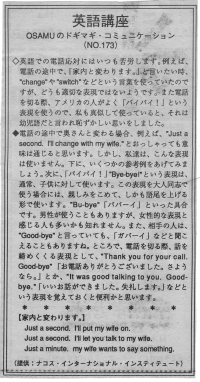電話かわります。
Just a second. I'll put my wife on. Osamu didn't know what to say when he gave the phone to someone else. He always said, "I'll change with my wife." because in Japanese they use the word "Kawarimasu" which literally means to change. He had to learn how to end the conversation appropriately. Japanese say "bye-bye!" but that sounds childish. There are some other ways he can end, such as: Bu-bye. Thank you for your call. It was good talking to you. Good-bye
英語での電話応対にはいつも苦労します。例えば、電話の途中で、「家内と変わります」と言いたい時、 ¨change¨や ¨switch¨ などという言葉を使っていたのですが、どうも適当な表現ではないようです。また電話を切る際、アメリカの人がよく「バイバイ!」という表現を使うので、私も真似して使っていると、それは幼児語だと言われ恥ずかしい思いをしました。
電話の途中で奥さんと変わる場合、例えば、 ¨Just a second. I´ll change with my wife.¨ とおっしゃっても意味は通じると思います。しかし、私達は、こんな表現は使いません。下に、いくつかの参考例をあげてみましょう。次に、「バイバイ!」 ¨Bye-bye!¨という表現は、通常、子供に対して使います。この表現を大人同士で使う場合には、親しみをこめて、しかも語尾を上げる形で使います。 ¨Bu-bye¨ 「ババーイ」といった具合です。男性が使うこともありますが、女性的な表現と感じる人も多いかもしれません。また、相手の人は、 ¨Good-bye¨ と言っていても、「ガバーイ」などと聞こえることもありますね。ところで、電話を切る際、話を締めくくる表現として、 ¨Thank you for your call. Good-bye¨ 「お電話ありがとうございました。さようなら。」とか、 ¨It was good talking to you. Good-bye.¨ 「いいお話ができました。失礼します。」などという表現を覚えておくと便利かと思います。
家内と変わります。
Just a second. I´ll put my wife on.
Just a second. I´ll let you talk to my wife.
Just a minute. My wife wants to say something.


